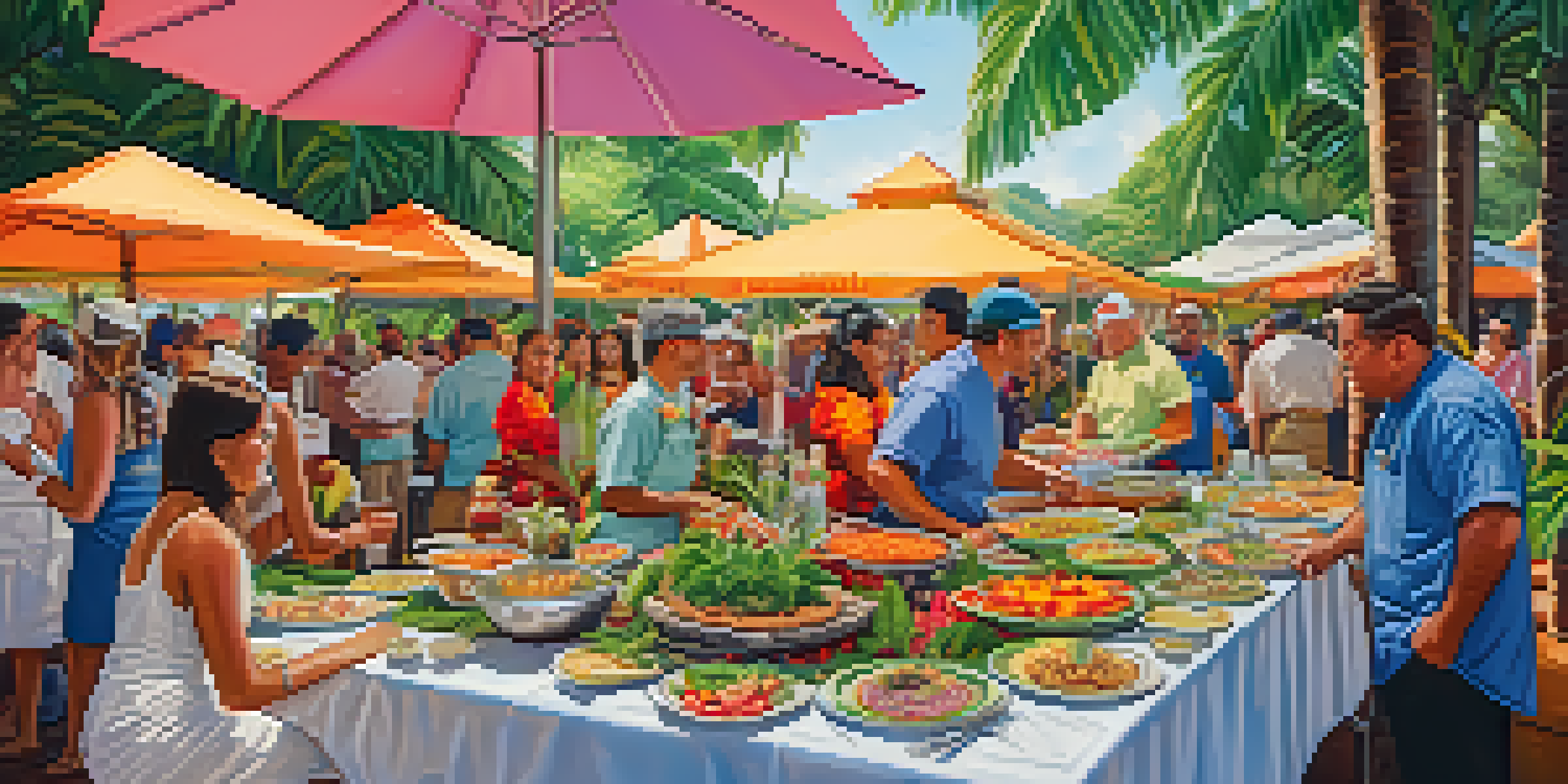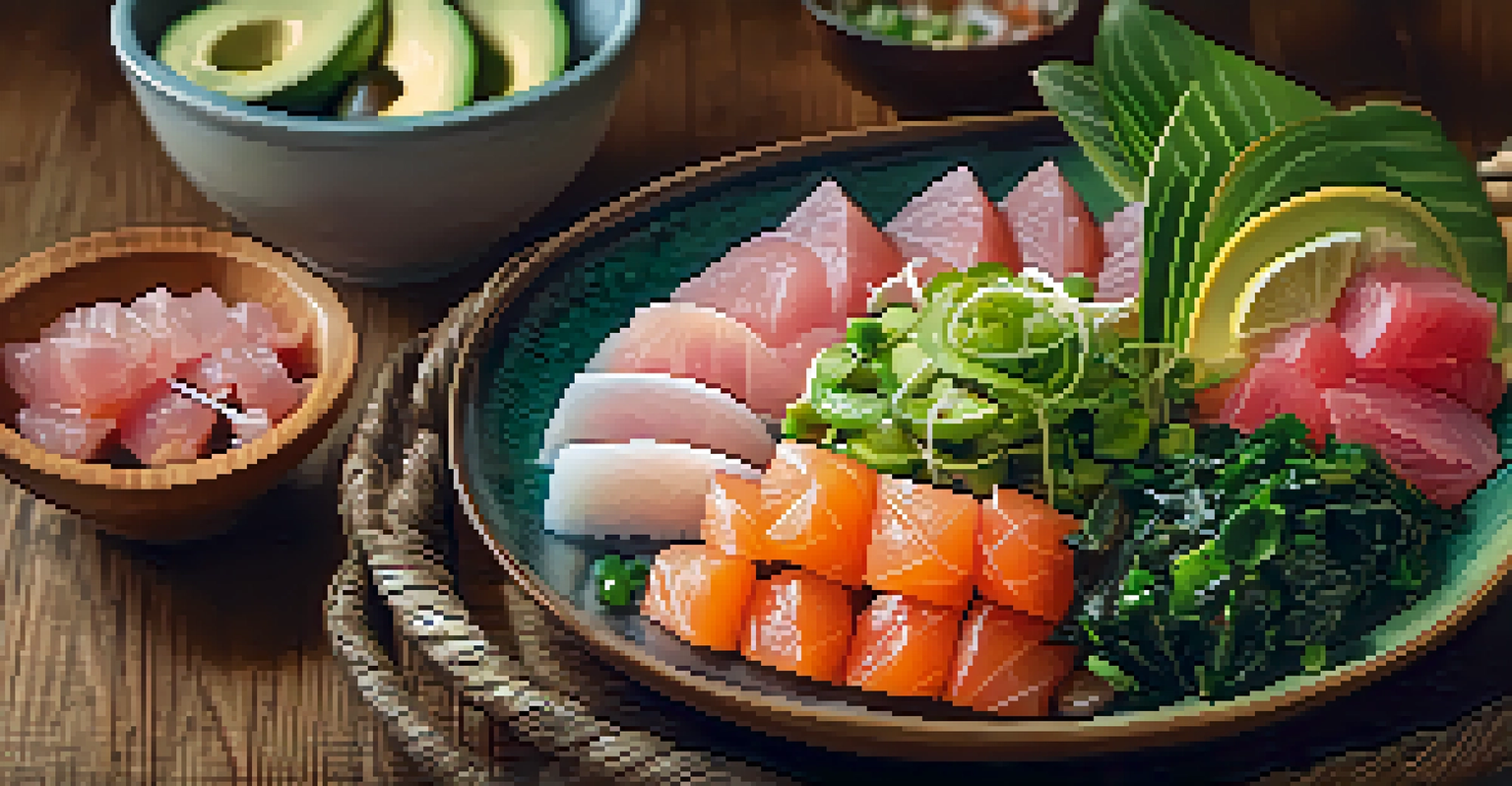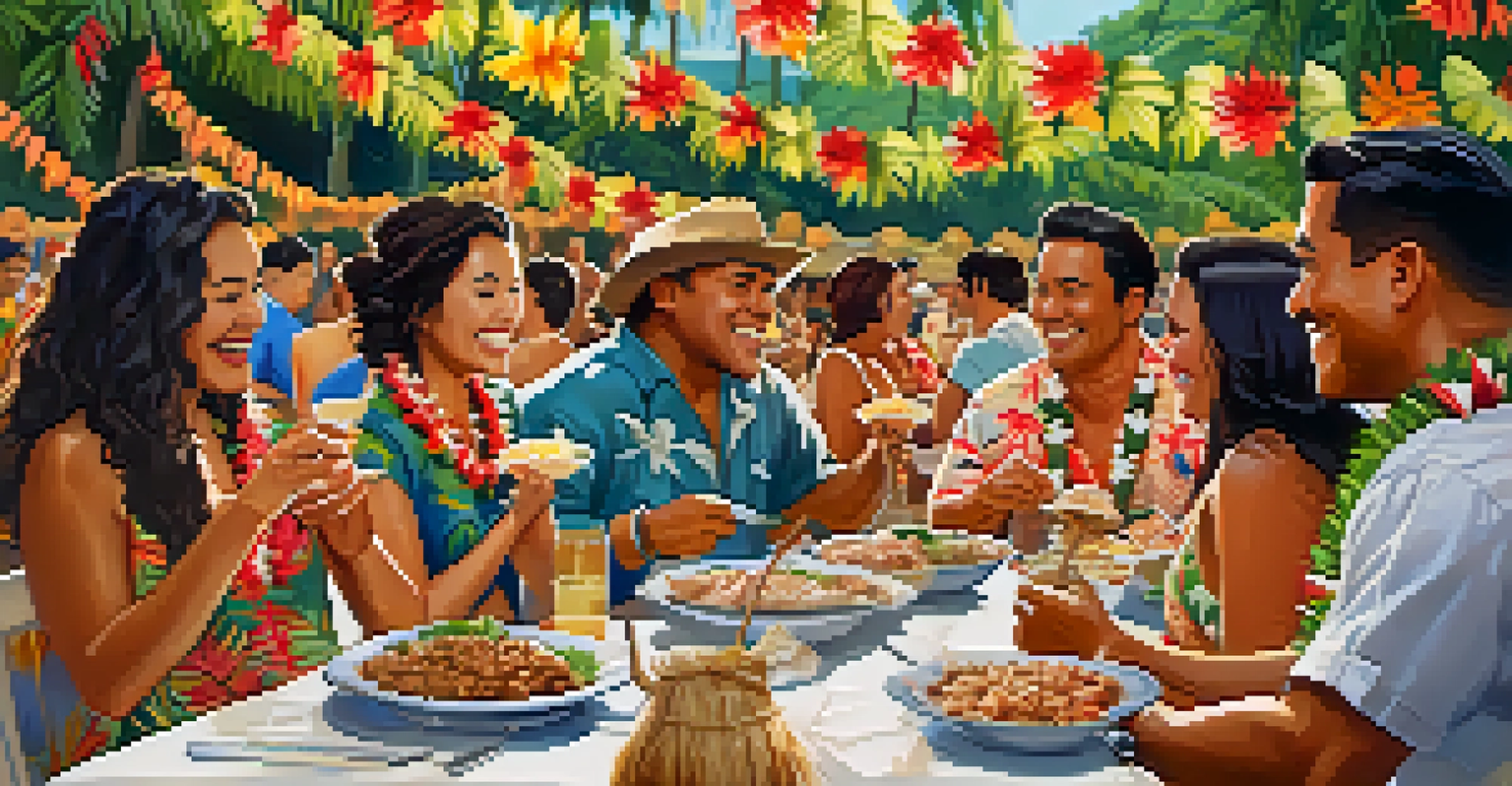Culinary Festivals: Celebrating Hawaii's Food Heritage

Discovering Hawaii's Unique Culinary Scene
Hawaii's culinary scene is a colorful tapestry woven from diverse cultures and traditions. From native Hawaiian dishes to Asian influences, the islands offer a rich palate that reflects its history. Each meal tells a story, often tying back to the land and the sea, showcasing the ingredients that make Hawaii unique.
Food is the ingredient that binds us together.
The flavors of Hawaii are not merely about food; they're about community and connection. Family gatherings often feature traditional dishes like poke or poi, emphasizing the importance of sharing meals together. This cultural significance is celebrated at various culinary festivals across the islands.
These festivals provide a platform for local chefs and home cooks alike to showcase their culinary skills. They highlight not only the food but also the stories behind each dish, fostering a deeper appreciation for Hawaii's diverse food heritage.
The Role of Culinary Festivals in Cultural Preservation
Culinary festivals play a crucial role in preserving Hawaii's food heritage while educating the community. They serve as a gathering point for sharing traditional recipes and techniques that may otherwise fade away. By engaging the younger generation, these festivals ensure that the cultural practices surrounding food continue to thrive.

Events like the Hawaii Food & Wine Festival emphasize the significance of local ingredients, many of which have been used for centuries. Participants not only get to taste delicious dishes but also learn about the sourcing and preparation methods that are deeply rooted in Hawaiian culture.
Hawaii's Festivals Preserve Culture
Culinary festivals in Hawaii play a vital role in preserving traditional food practices and educating the community about local culinary heritage.
Moreover, these festivals often include workshops and demonstrations, allowing attendees to actively participate in the culinary experience. This hands-on approach helps bridge the gap between generations, making the culinary arts accessible and exciting for everyone.
Highlighting Local Ingredients and Sustainability
One of the most exciting aspects of Hawaii's culinary festivals is the focus on local ingredients. Events often showcase fresh produce, seafood, and meats sourced directly from local farmers and fishermen. This not only supports the local economy but also promotes sustainable practices that are essential for preserving Hawaii's natural resources.
Cooking is like love. It should be entered into with abandon or not at all.
Sustainable farming and fishing practices are increasingly important in the face of climate change and overfishing. Culinary festivals bring awareness to these issues, encouraging chefs and attendees to consider the environmental impact of their food choices. By choosing local, festival-goers help protect Hawaii's unique ecosystems.
Additionally, many chefs use these festivals as an opportunity to experiment with traditional recipes, incorporating modern twists while staying true to their roots. This innovation keeps the culinary scene vibrant and exciting, encouraging a deeper appreciation for locally sourced ingredients.
Fostering Community Through Shared Culinary Experiences
Culinary festivals in Hawaii are more than just a celebration of food; they bring people together. These events foster a sense of community, creating bonds between chefs, food lovers, and local producers. Attendees often leave with not only full bellies but also new friendships and memories that last a lifetime.
Sharing a meal is an age-old tradition that transcends cultures, and Hawaii's festivals exemplify this beautifully. Whether it's sharing a plate of kalua pig or a scoop of haupia, the experience is about connection. The communal nature of these events encourages conversations and interactions that enrich the overall festival experience.
Focus on Local and Sustainable Ingredients
Many culinary festivals emphasize the use of local ingredients, promoting sustainability and supporting local farmers and fishermen.
Moreover, these festivals often feature entertainment, such as traditional Hawaiian music and hula performances, adding to the sense of community. The combination of food, culture, and togetherness creates a warm and inviting atmosphere that everyone can enjoy.
Spotlight on Iconic Culinary Festivals in Hawaii
Several culinary festivals have become iconic in Hawaii, drawing visitors from all over the world. The Hawaii Food & Wine Festival, for instance, features renowned chefs and offers a variety of tastings that showcase the best of local cuisine. It’s a must-attend for anyone looking to experience Hawaii's culinary excellence.
Another notable event is the Aloha Festivals, which features a variety of food-related activities, including the famous Aloha Taste of the Islands. This celebration highlights local chefs and their creative interpretations of traditional Hawaiian dishes, offering attendees a taste of the islands’ culinary diversity.
These festivals not only spotlight local food but also celebrate the cultural heritage of Hawaii. By participating, guests can immerse themselves in the rich traditions that shape the islands’ culinary landscape, making each festival a unique experience.
The Influence of Tourism on Hawaii's Culinary Landscape
Tourism has a significant impact on Hawaii's culinary scene, as visitors often seek authentic dining experiences. Culinary festivals cater to this demand, showcasing the islands' unique flavors while encouraging tourists to engage with local culture. This interaction benefits both tourists and local communities, fostering mutual appreciation.
As tourists explore Hawaii's culinary offerings, they help support local farmers, fishermen, and artisans. These festivals create a symbiotic relationship, where visitors gain insight into Hawaii's food heritage, while locals benefit economically. This relationship is crucial for maintaining the islands' culinary traditions.
Culinary Events Foster Community Bonds
These festivals not only celebrate food but also create connections among attendees, chefs, and local producers, enhancing the sense of community.
However, it's important for festivals to balance tourism with cultural authenticity. By emphasizing local ingredients and traditional cooking methods, culinary festivals can ensure that the essence of Hawaii is preserved, even as they adapt to the evolving tastes of visitors.
Future Trends in Hawaii's Culinary Festivals
As Hawaii's culinary landscape continues to evolve, so too do its culinary festivals. Emerging trends, such as plant-based cooking and fusion cuisine, are beginning to make their mark. Festivals are adapting by incorporating these trends, attracting a broader audience while still honoring traditional flavors.
Sustainability is also becoming a central theme in many culinary events, reflecting a growing awareness of environmental issues. Future festivals may place even greater emphasis on sustainable practices, encouraging attendees to make conscious food choices that benefit both the community and the planet.

In addition, the rise of technology and social media is changing how culinary festivals are marketed and experienced. From virtual tastings to interactive online workshops, these innovations promise to create new ways for people to engage with Hawaii's rich culinary heritage, making it accessible even from afar.